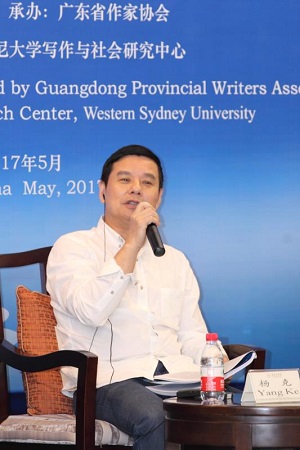楊克:從對(duì)現(xiàn)實(shí)深刻關(guān)注的有限中看到無限

從對(duì)現(xiàn)實(shí)深刻關(guān)注的有限中看到無限
1980年,我買了上海文藝出版社出版的《外國(guó)現(xiàn)代派作品選》,不僅是我,我們這一代人,很多人都是從這本書開始,第一次讀到西方現(xiàn)代主義作品。我十幾年前曾寫過文章,提及當(dāng)年第一次讀里爾克的《豹》這首詩(shī)時(shí)對(duì)我的精神沖擊。從此,可以說在幾乎整個(gè)80年代,我們都在狂熱讀西方現(xiàn)代后現(xiàn)代作品,包括各種文藝?yán)碚摵驼軐W(xué),深受歐美文學(xué)和拉美“爆炸”文學(xué)的影響,強(qiáng)調(diào)自我,認(rèn)為如何寫比寫什么重要,如梁小斌所言; 一塊藍(lán)手絹,從陽臺(tái)上飄下去,同樣也是意義重大的”。
可是寫了30多年,回頭看我自己的詩(shī)作,誠(chéng)然,如作家余華表達(dá)過的類似的觀點(diǎn):我以為自己是手法翻新的現(xiàn)代主義寫作,到頭來才發(fā)現(xiàn)其實(shí)骨子里是現(xiàn)實(shí)主義寫作。
我曾說過:“我寫關(guān)于世界的詩(shī)歌,將現(xiàn)代性鍥入現(xiàn)實(shí)關(guān)懷,把個(gè)體生命融入時(shí)代語境,呈現(xiàn)特定生存空間的元素,同時(shí)堅(jiān)信為人類寫作。”與“現(xiàn)場(chǎng)”和“當(dāng)下”構(gòu)成緊張關(guān)系,具有面對(duì)和處理“當(dāng)下”的能力,一直是我貫徹始終的有別于許多詩(shī)人的寫作追求。
有批評(píng)家認(rèn)為我詩(shī)歌的主調(diào),是文化批判和社會(huì)關(guān)懷,也許是小時(shí)候讀的中國(guó)傳統(tǒng)文學(xué)“憂患”意識(shí)的烙印,特別是《詩(shī)經(jīng)》和唐詩(shī)宋詞深入骨髓的浸透,我自詡學(xué)習(xí)先輩屈原、杜甫那樣寫作,守護(hù)一個(gè)詩(shī)人的語言良知。我詩(shī)歌中的日常生活并不僅僅是個(gè)人的瑣屑事情,內(nèi)心的追問也不僅關(guān)乎彼岸,而與公共空間的遭遇相切。比如我1985年的詩(shī)《大遷移》就寫了修電站搬遷22萬多人,山民“對(duì)腳下的土地”的陌生,傳統(tǒng)民俗的痛苦呻吟。1990年2月11日,南非當(dāng)局釋放他當(dāng)天,我就寫了《納爾遜·曼德拉》: “真理像潔白的牙齒閃亮”特蕾莎修女剛剛過世的1997年9月29日,我寫了《德蘭修女》,90年代,我寫了《在商品中散步》等一系列涉及中國(guó)由農(nóng)業(yè)文明背景斷裂為消費(fèi)信息社會(huì)的詩(shī),例如當(dāng)中國(guó)的第一家商場(chǎng)以“廣場(chǎng)”這種過去屬于政治術(shù)語的名詞命名,我寫了《天河城廣場(chǎng)》,當(dāng)中國(guó)成為世界工廠之際,我寫了《在東莞遇見一小塊稻田》,關(guān)于土地的變遷。早在世紀(jì)初,我寫了《太原》,其后《野生動(dòng)物園》等,涉及國(guó)人當(dāng)時(shí)甚少關(guān)注的環(huán)境生態(tài)問題。我很早就寫了《1967年的自畫像》,為小時(shí)候?qū)ξ母锲陂g武斗等事件的感受,《震驚》寫了林彪9.13事件;《羅姆尼新罕布什爾勝利集會(huì)》寫了美國(guó)總統(tǒng)選舉;《給那個(gè)踢球的人當(dāng)一回總理》寫了歐盟的經(jīng)濟(jì)危機(jī);《有關(guān)與無關(guān)》寫了復(fù)雜的國(guó)際政治和國(guó)內(nèi)政治關(guān)系。1987年我寫《電子游戲》,2014年寫《地球 蘋果的兩半》觸及微信,科技對(duì)人類生活的影響不言自明。而《人民》《如今高樓大廈是城里的莊稼》等詩(shī),可借用《南方周末》的廣告詞,在這里,讀懂中國(guó)。但我是一種傾聽的姿態(tài)進(jìn)入寫作,并不劍拔弩張。中山大學(xué)中文系副教授胡傳吉說:“楊克區(qū)別于多數(shù)詩(shī)人回避世俗,或?qū)⑹浪咨畛蠡膬A向,楊克的手法則是以一個(gè)相對(duì)溫和、儒雅的方式,主動(dòng)發(fā)現(xiàn)生活中那些溫情的部分,以及生活中自含的悲劇性。憤怒出詩(shī)歌是再容易不過的,要罵、批判一個(gè)東西非常容易,但溫和儒雅恰恰非常罕見卻又十分有力量。這種溫和、儒雅后面包含了一種智慧和冷靜。”
北京大學(xué)謝冕教授這樣評(píng)論我的寫作“他的詩(shī)總是這樣地充盈著歷史和現(xiàn)實(shí)的廣度和深度,飛翔的想象力加上對(duì)于現(xiàn)實(shí)的深刻關(guān)注,使他的詩(shī)總能讓人在有限中看到無限,從此岸眺望彼岸。也許詞語是單純的,但展開的卻是豐富和深邃。”吳思敬、楊煉、霍俊明、趙思運(yùn)、龔奎林等表達(dá)了相近的看法:楊克的詩(shī)歌“在自我、他者與社會(huì)的融合與齟齬中書寫底層人物的存在狀態(tài),呼吁對(duì)隱秘的社會(huì)現(xiàn)實(shí)的關(guān)注。在深刻沉重的同時(shí)展現(xiàn)社會(huì)疼痛”,“為考察一個(gè)詩(shī)人的靈魂史和更為本土化和個(gè)人化的‘中國(guó)’現(xiàn)實(shí)和歷史場(chǎng)域提供了一個(gè)個(gè)縫隙或者入口”;“有效地深度介入行走著的歷史語境,整合了這個(gè)時(shí)代的全息圖景”;是“‘人民’和中國(guó)文化真正的容身之所”。而張檸、甘谷列和張立群則說我“漫步城市的寫作”的另一個(gè)向度,“涉及一種‘新的城市經(jīng)驗(yàn)’的表達(dá)”,是“中國(guó)商業(yè)時(shí)代的詩(shī)歌典型”。
當(dāng)然一個(gè)詩(shī)人的寫作不可能具有哲學(xué)的一致性,我也寫語言實(shí)驗(yàn)的詩(shī),關(guān)于大自然的詩(shī),關(guān)乎自我的詩(shī)。特別是對(duì)時(shí)間的追問,是我寫作的重要部分。張檸還說:楊克就是屬于這樣一種類型,他面對(duì)一個(gè)陌生的事物時(shí)有驚喜的能力。在現(xiàn)代化的生存環(huán)境里,詩(shī)人對(duì)世界的好奇和新奇能力,就是詩(shī)性。”
A Gaze at the Infinite from the Limits of Profound Realistic Concerns
Yang Ke
I remember myself buying the book Foreign Modernist Works, published by the Shanghai Literature and Art Publishing House, in 1980. This book was the first encounter of a whole generation, me included, with western modernist literature. Then, over a decade ago, I wrote an essay about the deep impression that Rainer Maria Rilke’s poem The Panther left on me the first time I read it. It could fairly be said that from that moment and throughout the 1980s, that entire generation was eager to devour western modernist and post-modernist literature, including all kinds of artistic theories and philosophies. That era was greatly influenced by European, north American literature and by the “Latin American Boom”, trends that emphasized the Self and that considered How to be more important than What in literary creation. Just as Liang Xiaobin said “The floating descent of a blue handkerchief flying off a balcony is no less important than the blue handkerchief in itself”
Yet when I look back at my creations now, after over 30 years of writing poetry, I realize that I share the same feeling once expressed by Yu Hua: “I thought my writing technique had a fresh modernist style, but it turned out it was actually realist to the very bones”.
I once said: “The poetry that I write about the world makes modernity plunge into realistic concerns and the individual to merge with its time, thus displaying the elements of a specific coexistence space while firmly believing in writing for humanity.” I’ve always been distinguished from other poets in my quest for maintaining a tension between the “on-the-spot” and the “right now” and, specifically, in facing and handling the powerful strength of the “right now”.
Some critics think the keynotes of my poems are cultural criticism and social concerns. Maybe due to the footprint left by the consciousness of “suffering” in Chinese traditional literature, such as that found in The Book of Songs or in the poetry of the Tang and Song Dynasties, all of which I eagerly read in my childhood, I immodestly claim to follow the steps of poets like Qu Yuan and Du Fu in the sense of striving to maintain the linguistic wisdom of a poet. The ordinary life depicted in my poetry is not just about the trivialities of my personal life, nor only about a deep questioning of my inner self, but rather about the vicissitudes and encounters that public spaces provide. For example, in my 1985 poem the Great Migration I depicted 220,000 peasants relocated to make room for a power plant, the awkwardness of the “the earth under their feet” and the throbbing moaning of traditional customs. On February 11, 1990, the day Nelson Mandela was released by South African authorities, I wrote the poem Nelson Mandel: “The truth shines just like his clean white teeth.” On September 29, 1997, when Mother Teresa just passed away, I wrote the poem Mother Teresa. In the 1990s I composed Wandering in Commodities and a series of other poems about China shattering its longstanding agricultural civilization and diving into an era of information consumerism, example of which is the poem Tianhe City Square, that was written when the first mall of China was named “Square”, a word that previously belonged only to political terminology. I also wrote Encountering a Small Patch of Rice Field, a poem that depicts the transformation of the land and portrays China turning into the world’s factory. At the turn of the century I wrote Taiyuan followed by Safari Park, along with other poetic works swirling around environmental issues of which society was not very much concerned back then. Many years have gone since I wrote Self-portrait of 1967, a poem in which I depicted my feelings, as a child, towards the violence experienced during the Cultural Revolution. Shock was about the 9.13 Lin Biao incident; Romney’s Successful Gathering in New Hampshire was about the presidential election in the US; Be the Prime Minister for that Soccer Player was about the economic crisis in Europe; Relevant and Irrelevant depicted the complex political relationships at the national and international levels. I wrote Video Games in 1987 and Two Halves of the World Apple in 2014, to illustrate how “WeChat” and technology in general have undoubtedly influenced people’s life. As for poems like the People and Skyscrapers are Crops in the City, they are the poems to read if you want to learn about China, to quote Southern Weekly journal. But I’m never an aggressive writer. I always start to write as an open-minded listener. Hu Chuanji, associate professor of the Department of Chinese of Sun Yat-sen University once said, “Yang Ke has a different approach compared with many poets who tend to avoid or, even worse, vilify and debase mundane life. Yang Ke has a more mild and elegant style, which realizes both the warm-heartedness and tragedy amidst life. To write a poem out of anger just needs cursing and criticizing, a rather simple task. To be mild and elegant, on the other hand, is a rare and powerful force which carries wisdom and calmness within.”
Xie Mian, a Peking University Professor, reviewed my work in the following terms: “Yang Ke’s poetry is filled with vast and deep history and reality. His flying imagination is deeply rooted in reality, thus allowing us to see the infinite within the limited and to gaze at the opposite shore from this very bank. His words might be simple, but richness and depth underlie beneath.” Wu Sijing, Yang Lian, Huo Junming, Zhao Siyun and Gong Kuilin share similar opinions: Yang Ke’s poetry “depicts the living conditions of the lower classes amidst the mismatch between the self, the other and society as a whole. As they call our attention for that dark and hidden reality, they reveal with grave depth the pain which besets our society”; “opens the doors or cracks to observe the history of a poet’s soul and the history of China from a more local and personal perspective”; “provides a holographic panorama of this era by deeply plunging into the moving historical context.”; is “the true shelter for ‘the people’ and Chinese culture”. Zhang Ning, Gan Gulie and Zhang Liqun said that another dimension of my “roaming-in-the-city writing” “involves ‘a(chǎn) new urban experience’ expression” and is “the paradigmatic poetry of China’s commercial age”.
But of course a poet’s writing cannot be philosophically consistent. I also write poems that experiment with words, poems about nature and poems about the Self. Moreover, an important part of my work swirls around deep questionings about time. Zhang Ning also said, “Yang Ke is one of those people blessed with the ability to be surprised at new things. In this modern era, a poet able to be curious and amazed by the world is, indeed, a poet by nature.”


